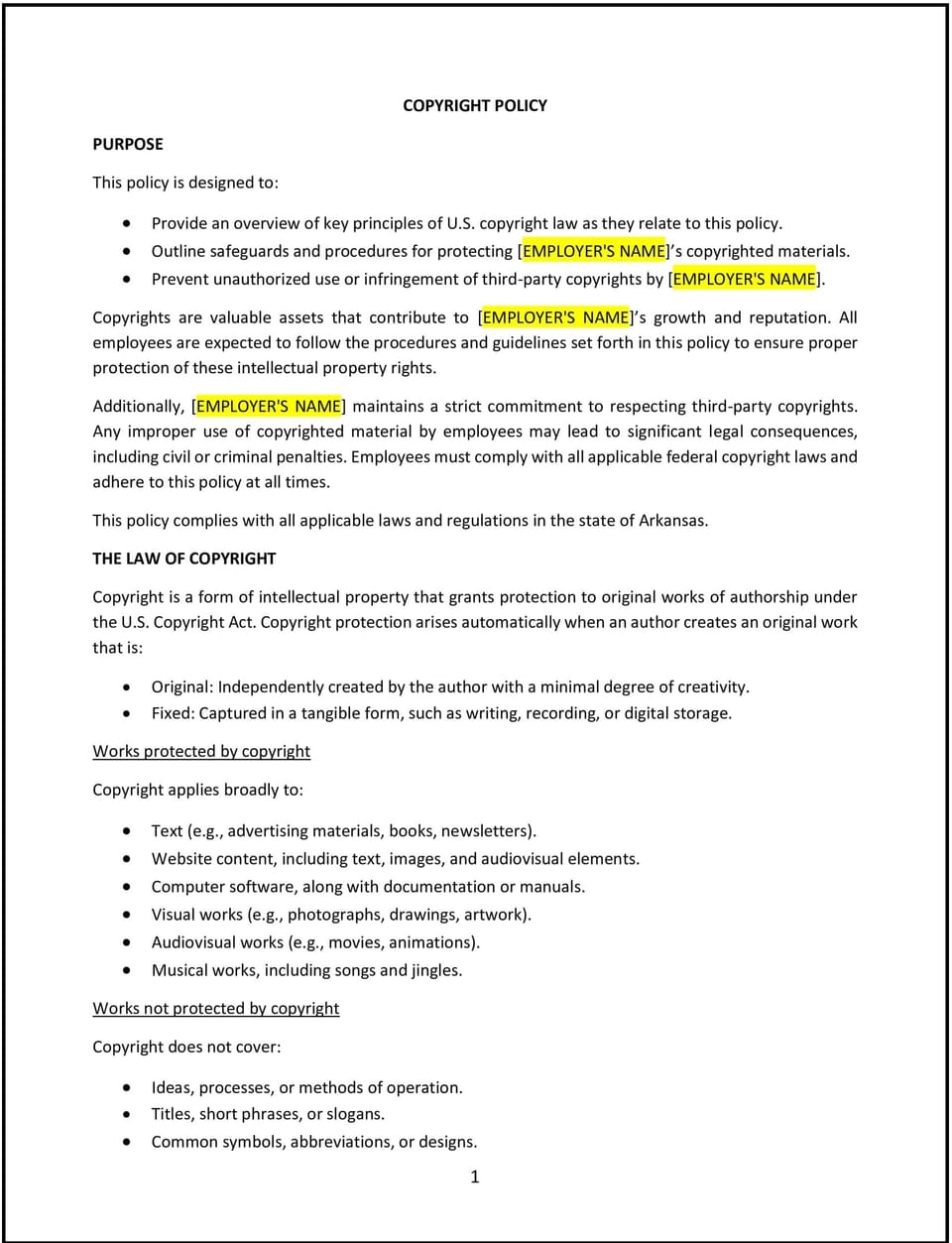Copyright policy (Arkansas): Free template

Copyright policy (Arkansas)
In Arkansas, a copyright policy provides businesses with guidelines to protect their intellectual property and ensure compliance with copyright laws. This policy outlines how copyrighted materials can be used, distributed, and safeguarded, while also addressing the proper handling of third-party intellectual property.
This policy establishes procedures for protecting the business’s creative works, managing licenses, and addressing copyright violations. By implementing this policy, Arkansas businesses can protect their intellectual property, reduce legal risks, and promote ethical practices.
How to use this copyright policy (Arkansas)
- Protect intellectual property: Clearly state that all original works created by the business, such as content, designs, and software, are protected under copyright law.
- Define proper use: Specify how employees and third parties may use copyrighted materials owned by the business, including limitations and licensing requirements.
- Address third-party content: Provide guidelines for using third-party copyrighted materials, such as obtaining permissions or licenses and avoiding infringement.
- Establish reporting procedures: Create a process for employees to report suspected copyright violations or unauthorized use of the business’s materials.
- Train employees: Educate employees on copyright basics, including fair use, licensing, and the importance of protecting intellectual property.
Benefits of using this copyright policy (Arkansas)
This policy offers several advantages for Arkansas businesses:
- Protects business assets: Safeguards the business’s creative works, maintaining their value and ensuring exclusive rights to their use.
- Reduces legal risks: Ensures compliance with Arkansas and federal copyright laws, minimizing the risk of infringement claims and penalties.
- Promotes ethical practices: Establishes clear expectations for the use of copyrighted materials, encouraging ethical behavior among employees and partners.
- Supports compliance: Aligns with state and federal copyright regulations, ensuring proper management of intellectual property rights.
- Enhances reputation: Demonstrates the business’s commitment to protecting intellectual property, building trust with stakeholders and clients.
Tips for using this copyright policy (Arkansas)
- Address Arkansas-specific considerations: Include any state-specific requirements for managing copyrights or intellectual property in the policy.
- Monitor usage: Regularly audit the use of copyrighted materials within the business to ensure compliance with this policy.
- Register copyrights: Where applicable, formally register the business’s copyrighted works to enhance legal protections and enforcement capabilities.
- Document permissions: Keep records of all licenses and permissions obtained for third-party materials to ensure clarity and legal compliance.
- Review and update: Periodically update the policy to reflect changes in copyright laws, technology, or business practices.
Q: How does this policy benefit the business?
A: This policy protects the business’s creative assets, reduces the risk of copyright disputes, and ensures compliance with Arkansas and federal intellectual property laws.
Q: What types of materials are covered under this policy?
A: This policy covers original works such as written content, designs, software, graphics, videos, and any other creative works produced by or for the business.
Q: How does this policy support compliance with Arkansas laws?
A: The policy aligns with Arkansas and federal copyright laws, ensuring proper use and protection of intellectual property while mitigating legal risks.
Q: What should the business do if its copyrights are infringed?
A: The business should document the infringement, notify the violator formally, and, if necessary, pursue legal remedies or engage with an intellectual property attorney.
Q: How can employees ensure proper use of third-party materials?
A: Employees should obtain necessary licenses or permissions, follow fair use guidelines, and consult with legal or compliance teams when in doubt about usage rights.
This article contains general legal information and does not contain legal advice. Cobrief is not a law firm or a substitute for an attorney or law firm. The law is complex and changes often. For legal advice, please ask a lawyer.


